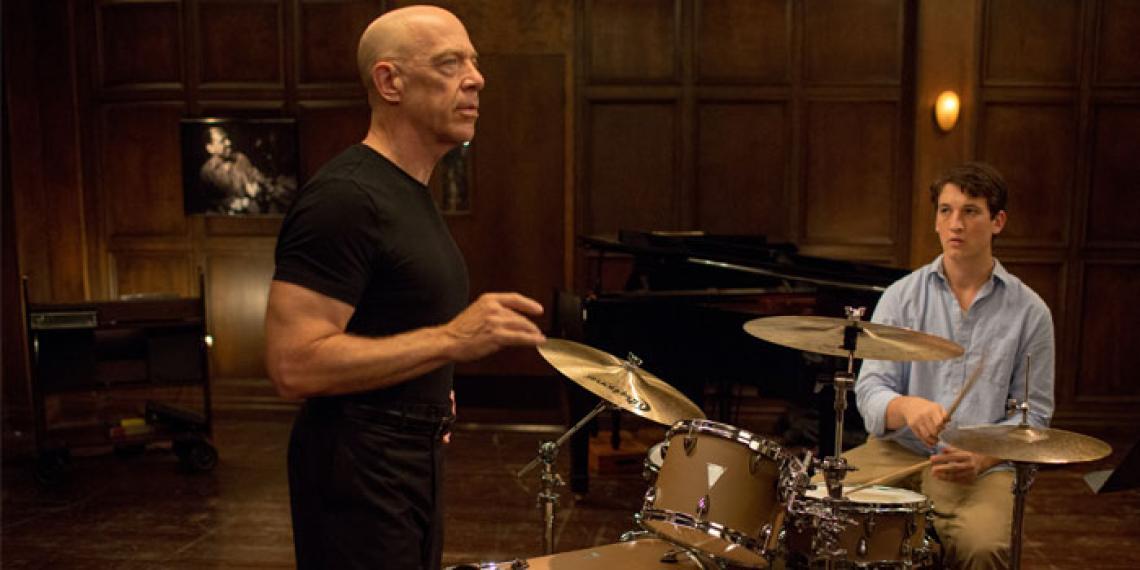You are here
Film Review - Whiplash

Many of us still strive toward some idea of perfection. And when we fail to achieve it, there can be huge tension.
Whiplash explores this tension in the context of competitive jazz. It charts the relationship between promising young drummer Andrew (Miles Teller) and his abusive, obsessive music instructor (J.K. Simmons).
Fletcher shames, manipulates, and physically and emotionally abuses his pupils. He directs extra measures of wrath on the pupil with the most promise, which is why he and Andrew are enemies for much of the film, yet they also need each other.
Fletcher, a man who maintains that the most harmful two words in the English language are ‘good job’. Andrew is brought to literal blood, sweat and tears repeatedly in the film, as the collision between his drive and Fletcher’s punishing temper gradually produces something brilliant.
But Fletcher also provides something that Andrew desperately needs: discipline. One minute Fletcher encourages Andrew, and the next he’s slapping him in the face. One minute Andrew is Fletcher’s go-to drummer, and the next he’s kicked out of the band.
Whiplash poses the question: does true artistic genius need to come from a place of fear – fear of failure? Fletcher thinks so. He thrives on breaking his students down, just to see if any of them will achieve greatness. It’s tough to watch how far Fletcher will go to destroy Andrew’s confidence, and how eagerly other students go along with Fletcher’s methods. Fletcher is a god among men at the school, and is treated as such by his students.
Whiplash asks another question too: must serious, game-changing artists sacrifice things like healthy interpersonal relationships and domestic stability? Andrew seems to think so. He has no friends and doesn’t seem to care for his family or even the girl who catches his eye (Melissa Benoist). For him, attachments get in the way. The only person he really connects with in the film is Fletcher, and then only because he sees in him the same wild-eyed, reckless passion for jazz that he himself has.
It’s unclear whether the rigor of practice sessions, rich in psychological torture and sweaty breakdowns, will push Andrew and his cohorts to greatness, or destroy them on a spiritual level.
Whiplash derives much of its thrilling unpredictability from its principled unwillingness to reveal what kind of movie it will ultimately be. Is it an unusually tense, dark and profane example of the subgenre where a passionate but unconventional mentor leads his charges to greatness through exhausting but ultimately productive means? Or is it a grim dual character study about how the pursuit of greatness, when removed from any other considerations (including empathy and concern for other people) can transform people into monsters?
Whiplash powerfully conveys how the monomaniacal focus and intensity necessary to achieve greatness can coarsen and corrupt both sides of the mentor/protégé relationship
Director Chazelle emphasizes physicality, from the close ups of musicians moistening their reeds to Andrew’s calloused hands to the blood that spatters onto the drums during his most feverish performances. Given all these bodily details, there’s an aspect to Whiplash’s striving that perhaps recalls the Christian striving for perfection in Christ.
Matthew 5:48 is perhaps the most well-known biblical reference to perfection: ‘You therefore must be perfect, as your heavenly Father is perfect.’ But the Greek word for ‘perfect’ (teleioi) used here does not mean ‘flawless’, it means ‘complete’. So, our perfection as Christians is found when we embrace the fullness of Jesus in our lives, which brings with it the power to say no to sin—not when we mercilessly beat ourselves up in the pursuit of some unobtainable ideal of excellence.
Yet the physicality and bloodiness of some of Chezelle's imagery tells us that striving for this perfection or excellence is a bruising and battering process. The film refuses to offer a pat answer to the questions it raises about perfection.
Miles Teller and J.K. Simmons are phenomenal in their parts, playing off each other as brilliantly as one horn to another in a jazz ensemble. Both should receive Oscar nominations, as should the film itself, which won the audience and grand jury prizes at this year’s Sundance Film Festival.
Brilliantly edited and scored, Whiplash is uncomfortable yet hugely compelling and is the film of the year!
Review by Martin Barratt
Whiplash
Genre: Drama
Director: Damien Chazelle
Rating: R13 (Violence, offensive language)
Run time: 1hr 45mins